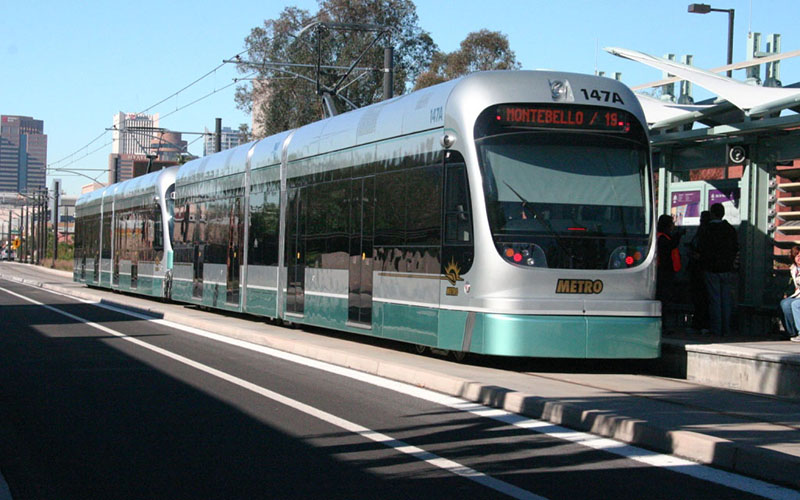Updated Thursday at 5 p.m.
PHOENIX – Three extensions of the Valley Metro light rail system will move forward after voters rejected Proposition 105, which would have halted the expansion.
With 185,852 votes tallied, unofficial returns showed Prop 105 trailing 63% to 37%.
Phoenix voters on Tuesday also shot down Proposition 106, which would have limited the city’s budget growth unless pension obligations were at least 90% funded. The vote was 66% opposed and 33% in favor, with 180,054 ballots counted, according to unofficial returns.
Phoenix Mayor Kate Gallego on Wednesday acknowledged light rail critics and skeptics while claiming victory.
“We’re really proud of the campaign that came together to support ‘No’ on 105. It brought together business leaders, unions, nonprofits, we had older adults working alongside students, it crossed party lines and included people from every part of our city.”
Gallego called light rail “a powerful tool for development in the city” and said it has helped build a “more urban and modern city.”
“If you look in our downtown where we are today, it’s helped us add more density. We have traffic problems in our downtown at rush hour. While we still have a fair amount of vacant land, we wouldn’t be able to grow and develop without having transportation options.”
Gallego said light rail better connects to all parts of the city, and she praised it for “serving people with disabilities, including those who use wheelchairs. … It’s a great mode of transportation for people who want to move independently, which I think is all of us.”
The margin of victory “sent an important message,” the mayor continued.
“Voters in Phoenix support our light rail and they want to see it expand, we will continue to have dialogue about it. There are certainly people in this community and our country who don’t support mass transportation. But I do think the voters send a strong message that they want light rail to be part of our future.”
Tuesday night, Gallego told supporters that Phoenix officials are “committed to working with stakeholders along the existing light rail as well as the future extensions. We want to learn what is working well and how we can do better.”
Scott Smith, CEO of Valley Metro, told KTAR that he was grateful for voters’ support.
“I think the one thing that’s crystal clear is that voters have said, in no uncertain terms, they like public transportation and they like light rail and they want to extend it,” he said Wednesday.
City Councilman Sal DiCiccio, a supporter of Props 105 and 106, took to Twitter to react: “Like many of you, I am disappointed to see tonight’s election results. I want to thank everyone who worked on these initiatives and who helped share our message throughout the city,” adding that he will continue to demand “accountability and fiscal responsibility” to make Phoenix “the best city in the country.”
The three light rail extensions are along Central Avenue from downtown to south Phoenix; from Central west to the state Capitol; and west from 19th and Dunlap avenues to Metrocenter. The 26-mile-long system now runs from Phoenix to Tempe and Mesa; regional transportation officials want to expand it to 66 miles by 2034.
If approved by voters, Prop 105 would have significantly restricted the way the city could allocate public transportation funding. It would have reallocated money raised by the tax increase passed in 2015’s Proposition 104 to “other transportation infrastructure improvement projects in the city,” as well as killing all ongoing Phoenix efforts to expand light rail.
The proposition also would have increased funding to the Citizens Transportation Committee, which makes recommendations to the city regarding public transit issues, by $25,000 a year.
Light rail has been contentious since before construction began on the first leg in March 2005; the first trains began running in December 2008.
Supporters consider light rail an economic stimulus, and they called the sponsors of Prop 105 an out-of-state special-interest funded by Charles and David Koch, the billionaire brothers who fund many libertarian causes.
Opponents always have cited the expense of light rail, and they contend the loss of lanes on major roads will do more harm than good. They argue that light rail funds should instead be dedicated to improving surface streets.
Officials had predicted a good turnout for the special election, and nearly 170,000 early ballots were cast before Tuesday. There are nearly 767,000 voters in Phoenix, according to the Maricopa County Recorder’s Office.
Video by Melanie Porter/Cronkite News
KJZZ reporter Christina Estes contributed to this story.

